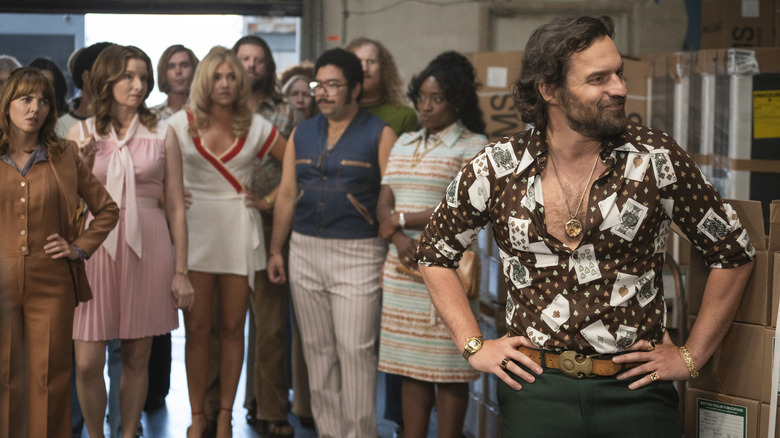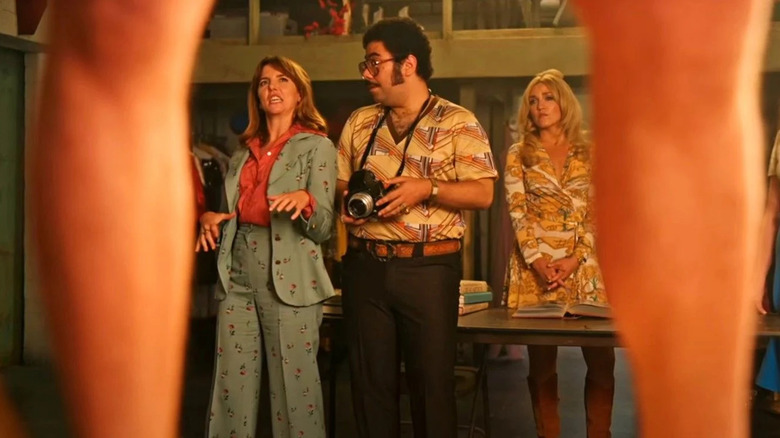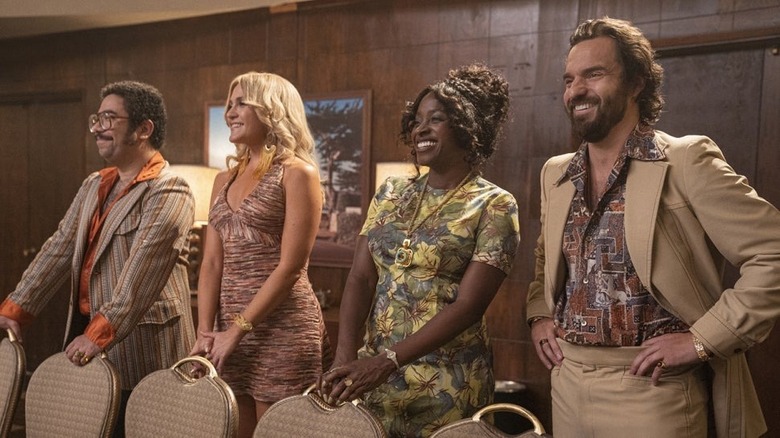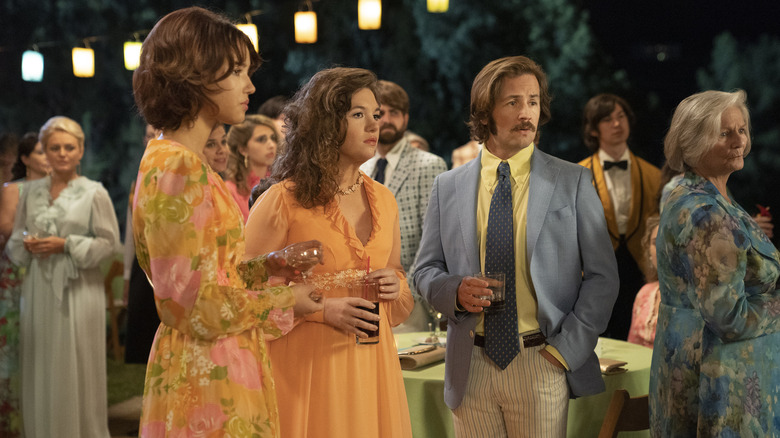How Minx Creator Ellen Rapoport Went From Law To Screenwriting [Interview]
Ellen Rapoport is the creator and executive producer behind the new HBO Max critical darling, "Minx." Rapoport takes viewers back in time to the '70s to show the rise of a new porno magazine for women. The series is a bit of a buddy comedy between writer Joyce (Ophelia Lovibond) and her publisher, Doug (Jake Johnson), two ambitious people with two different approaches to art and business.
For Rapoport, she wanted to have fun with the times without sugarcoating them. Rapoport and the writers uses pieces from history, like how "lame" the L.A. mob was back in the day, but in general, they wanted to make "Minx" a feel-good series. Recently, the creator told us about her original vision for the show and how she transitioned from law to screenwriting.
'They called it dropping the H bomb'
Jake and Ophelia told me a little bit about your background. You went to Harvard, correct?
I went to Harvard Law School. Yes. I'm a disappointment to my parents.
How did you go from law to screenwriting?
Well, I grew up in the Midwest. My parents were immigrants, and I didn't know that writing was a real job. I just grew up in one of those towns where everyone went into accounting or something. I think when you're somebody who likes to write, but you're looking for a safer career, you often get pushed into law school. Which is what I allowed to happen to me, so I went to law school. I was miserable. I hated every second of it. I thought it was incredibly boring.
In our third year, we had to write something called the third year paper, which was this legal thesis. It was supposed to be a hundred pages long about some issue, and I really didn't want to do it. I was taking a class, I wish I could remember the name, but it was basically about literature as a form of persuasion. Which is to persuade somebody. I mean, obviously this person did not want to be a law school professor, either. So, it was about how works of fiction can be persuasive tools. So, I convinced that person to let me write a courtroom drama as my third year paper. And so that's how I started writing. I got an A and I started writing scripts.
You may have dodged a bullet. So many lawyers are unhappy.
I think that there is probably a way to be a lawyer and to be happy, but I was a corporate lawyer and I think you're always on the wrong side when you're a corporate lawyer. I remember they would call all the summer associates in to hear what the partners were working on and this woman stood up and she said, "We have this big tort case. There's this company in upstate New York that's been polluting and women can't get pregnant. When they do, the babies are born with birth defects." I was like, "Oh my God, that's amazing." And then she said, "And we represent the company and, of course, that's who can afford to pay your fees." It just felt — drudgery mixed with evil was my experience, the law.
It's interesting to hear that, because a lot of the show is obviously about Joyce having to confront expectations about herself, her work, everything.
You actually identified exactly what was my way into the story, because I think the entertainment industry obviously does not care where you went to law school or what degree you had or really anything academic. There are plenty of very successful people who never graduated from high school. I think the people who are successful here often have a different kind of intelligence, which is emotional intelligence, which is what I think enables you to make good movies and television.
I did have to learn that people who might not have been brought up the same way as you, or value the same things as you, or be as academic as you, or actually know what they're doing a thousand times more than you and are better than you because they've tapped into something that connects with people.
Did Harvard Law help shape your outlook and approach to writing?
I think that being a lawyer gives you a good work ethic. I don't know, actually, if it really helps you with the kind of writing that I do. I think that law school is designed to make you think like a lawyer, which is thinking in a very specific way that I think is almost the opposite of how you think as a writer. But I think it makes people think you're smart, which is always helpful. I don't think it actually makes you smart, but I think like any perception of intelligence is always helpful, whether or not it's accurate.
Right. People hear or think "Harvard," they have expectations.
Well, what I think is funny is that when we were at Harvard, we were told not to ever say that you went to Harvard. They called it dropping the H bomb, which is the most absurd thing that actually I've ever heard, which is like, "Oh my God, you're going to drop a bomb into the conversation. People won't be able to handle it. They'll have to hide under their desks or their faces will explode." Everyone would say, "Just say in Boston or in Cambridge," which is the most pretentious thing imaginable. It's really pretty funny.
'You want, weirdly, porn to feel aspirational'
When you started writing "Minx," what was your initial vision for the series? How does the season itself compare to what you first imagined?
I was inspired by the real magazines of that era. These feminist magazines that also trafficked in erotica, and these were workplaces that were populated by women feminists, really, and pornographers trying to make these magazines together, and really dealing with these issues that we're still dealing with today. You know, all the articles are so contemporary — they're about rape, abortion, sexual harassment.
I knew, obviously, that this would be a great workplace comedy. I mean, if you're a writer and somebody says feminist and pornographers together in a workplace, and your brain doesn't turn on? I mean, that's crazy. I thought it was obvious. I think that the characters took a little time to come into focus because I did a lot of research on the real people who are not really clean characters and the '70s themselves are just so complicated.
I really wanted to do something that veered away from the cliche of what you think about when you think about a pornography workspace. Once I really landed on Doug's workplace, and I think that these kinds of publishers exist today, right? These publishers of a million niche magazines that you see on the shelves at Target. They put out 10 keto magazines and they see which one hits and they're like, "Okay, I'm going to do that." Where there's not necessarily so much thought or love put into these things because they're products.
So, that is how I started thinking about Doug. He's a businessman and his product is nude women, and that's not a bad thing. He could have been successful doing something else. So that felt like a good way to subvert this cliche, not having be in a sports car in some f*** pad. Everyone else developed that way. The same thing with Joyce: I wanted her to feel like a fish out of water, both in the porn world and in the feminist world. She's not necessarily in tune with the feminists of her generation, and she becomes more not in tune with them as the show goes on.
What about The Valley in particular? Any research about that time and place that helped shape the characters and stories?
We definitely did do research in the writers' room on The Valley at the time, but I mean, there's actually — this is something I discovered after we shot the pilot — but there really was this community of these low-level magazine porn publishers in The Valley. It wouldn't have been a national magazine that you ever heard about. It was this kind of subculture.
At the end of the day, I tried to do as much research as I could. All of the writers in the writers' room would get books and they all wanted to research the mafia in 1972, the L.A. Mafia, the art world, which kind of comes in later on.
We took the details and the decorations from them and had to make our own world, because I think the tone of the show is really specific. I think you want, weirdly, porn to feel aspirational. I think that if you get too into the nitty gritty and you adhere too closely to reality, it might not work. It might not be as fun. For example, you just watched episode 5. The L.A. mob was actually very lame. The capo [or captain] was killed in 1960 and they just didn't even bother to replace him. They were losers. They were the losers of the mafia. We would look at their houses and they weren't doing well. It was not profitable to be in the mafia.
[Laughs] That'd probably make for a fun show, too.
That's so funny that you say that. I feel like for the first five episodes when we were at the country club we thought, "What if we do a Winmark Club spinoff and there's a murder?" It did seem we had a lot of big cool locations, but I would love somebody to turn it into a spin-off.
'You just don't want a hat on a hat'
This is a very cinematic half-hour comedy. How did you and the filmmakers want to approach visualizing the times?
I think that I have this personal philosophy, which is that when you have a big idea, as we did, you want everything else to feel grounded. You just don't want a hat on a hat. So right away, we always knew that we would want the production design, the cinematography, the costume design, hair and makeup, everything to be based in reality and to feel grounded.
Our director, Rachel Lee Goldenberg, is somebody who shoots that way and nothing she does is pushed or crazy. There's no insane camera moves just to do a camera move. I think she has this real talent for making things feel real and lived-in and beautiful. It was a conscious decision to create a nostalgic, romantic, and very grounded atmosphere.
This time period is always funny to depict, too. You don't want to lampoon or make fun of it, like the '80s, but there are some inherently funny aspects of the time, right?
Yeah. For example, our costume designer, I hired her because I read this interview that she did about "Glow,” which is another show that she worked on. She's like a writer in a way, where each piece of clothing has this story behind it. She brought that to our show as well, where everything was so intentional and thoughtful. What would this woman and this time with her upbringing pick out of her closet to wear this occasion? What would make her feel confident? I think you really see the clothing grow over the course of the season. We just tried to find those department heads, and I think we succeeded in that.
Ideally, how many seasons of "Minx" would you want to make?
I would love for it to go into the '80s. I think what happened was so interesting, how the whole country took a real conservative shift with Reagan being elected president and how the feminist movement really splintered in two with the pro-pornography and the anti-porn feminists. I'd also love for them to go corporate and move to New York, sell "Minx" to a big conglomerate. See Doug in that position. I think it could go all the way there. So what is it, '72? So, I don't know. 12 seasons.
"Minx" is now streaming on HBO Max.



